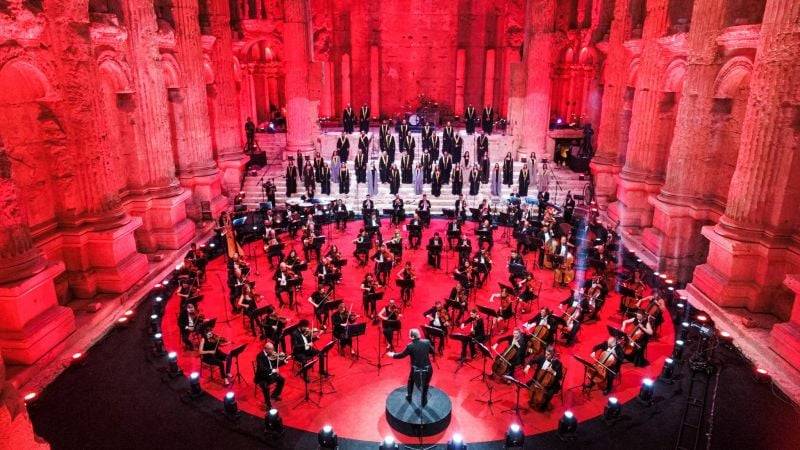
On July 5, 2020, the Baalbeck Festival presented its concert "The Sound of resilience" designed by maestro Harout Fazlian, featuring the Lebanese Philharmonic Orchestra and the choirs of Antonine University, Notre-Dame University and of The Voice of Yesteryear. (Credit: DR)
“All Lebanese musicians have left the country. It’s no longer possible to make it here,” Lebanese conductor Harout Fazlian told L’Orient-Le Jour.
The Lebanese Philharmonic Orchestra, which Fazlian led before the 2019 economic crisis, no longer exists. More than half of the orchestra's 90 musicians were recruited from abroad, mainly Romania, more than 20 years ago. They were meant to make up for the lack of personnel in some categories such as wind instruments.
“Foreign musicians had to train Lebanese musicians to play their instruments,” said conductor Toufic Maatouk.
“In addition to the current crisis, Lebanon lacks a cultural and music strategy. It is a systemic problem related to education. The conservatory is not a higher institute that trains professionals, but rather a music school, where children and young people do parallel activities,” he said.
‘I try to be less frustrated’
“An artist needs to create, even if it implies traveling abroad,” said Fazlian.
Appointed music director of Expo 2020 Dubai last year, the main conductor of the Lebanese National Higher Conservatory of Music continues to work in the Gulf and Iraq.
Similarly, a few months ago Maatouk was appointed executive manager of programming for the Abu Dhabi Festival.
“I’m trying to be less frustrated in my career,” he said. “In Abu Dhabi, I feel that my skills are respected and appreciated.”
In 2020, Maatouk resigned from his post at Lebanon’s Antonine University and the conservatory for the post of artistic director at the Royal Opera House Muscat, in Oman, before the COVID-19 lockdowns.
Then, he got another offer which he hastened to accept. This time, Maatouk went to Saudi Arabia, where he founded the first conservatory, the Saudi Music Hub in Jeddah, under the Culture Ministry’s supervision. He also served there as an advisor.
Maatouk also regularly worked on international projects.
“There is no way to implement cultural projects or to get paid in Lebanon. The economic situation makes things impossible,” Maatouk said. Despite this reality, Maatouk gave in to the Lebanese conservatory’s insistence that he works for them remotely and he continues to wear his hat as artistic director of the Beirut Chants Festival.
‘I have not given up on Lebanon’
After spending 12 years in Romania and two years in Austria where he obtained a Ph.D., conductor Lubnan Baalbaki, brother of singer Soumaya Baalbaki, returned to Lebanon in 2013. Hailing from a family of artists and musicians, he accepted Lebanon’s limits.
Baalbaki mostly works on classical and oriental music concerts, sometimes pop-influenced, alongside contemporary artists like Marcel Khalife and Majida al-Roumi.
“With the exception of Qatar and Oman, there is no symphony orchestra in the Gulf,” Baalbaki told L’Orient-Le Jour.
“As long as I can travel back and forth to conduct orchestras in America, Eastern Europe or the Middle East, cultural management or teaching won't be my kind of things,” he added.
Baalbaki worked as an arranger and composer for Al-Jazeera s Baraem TV channel before being appointed conductor of the Philharmonic and Oriental orchestras at the National Conservatory in 2012.
“We need to offer attractive salaries so that foreign musicians come back. But it seems that the crisis is here to stay,” he said.
“Even if there are hardly any festivals or concerts, I have not given up on Lebanon. In any case, the crisis in the sector is global; the frequency of events has decreased with COVID-19,” Baalbaki said.
Even those who have left the country for better opportunities still look back on Lebanon fondly.
“I did not emigrate, everything I do abroad is for Lebanon,” said Fazlian. “The Lebanese public deserves to see top-notch projects, and I prefer to do things right.”
“Until now, the economic situation, the difficulty to find sponsors and money hinder big projects in Lebanon,” he said.
Maatouk said he would never give up on Lebanon. “I left to gain new experience in the middle of my career. I would like this knowledge to benefit the country,” he said.
“But music teaching is not taken seriously in Lebanon. We must change our perception, separate the national conservatory from the symphony orchestra and above all, invest in the youth, otherwise Lebanese music will have no future.”
This article was originally published in French in L'Orient-Le Jour. Translation by Joelle El Khoury.